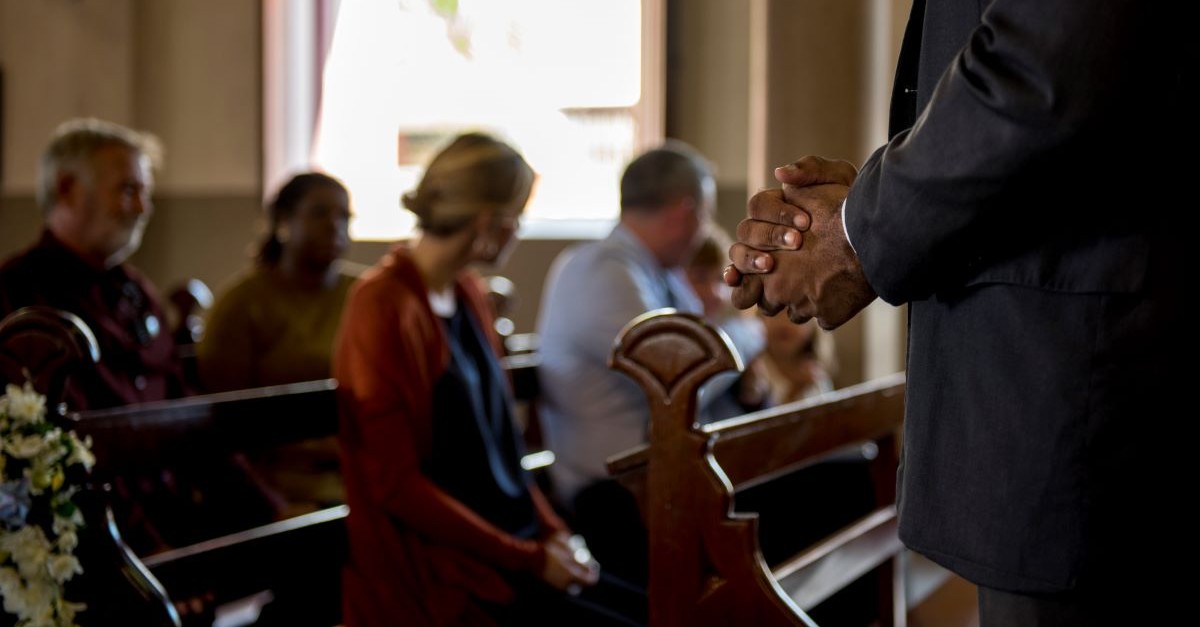
Today as I sit to write, I want to talk to you as a parent. This an open letter written in two parts to two separate audiences. The first part is written to pastors and leaders of churches of all sizes, whether large or small. The second part is written to the congregants of those same churches, whether large and small.
Whether you recognize it or not, there is a forgotten population of people that are being left out of churches, left out of ministry, and unfortunately in many cases are not even welcome in the church at all. I know you may gasp when you hear that statement but unfortunately, I've heard too many stories and experienced myself first-hand that this is true. The population I’m referring to are people and families with disabilities.
If you are not aware, there are mainly two types of disabilities: there are physical disabilities and developmental disabilities. Developmental disabilities for example are people that may have autism or Down syndrome or some other type of developmental delay. Unfortunately, these people or these types of people are not welcome in many churches across our country.
Photo credit: ©Getty Images/dragana991
To Pastors and Leaders...

Studies show that one in four people have some type of disability in our country. Yet if you look at the population of churches, they don’t reflect this reality at all. It's very easy to recognize that one in four people in churches do not have a disability. This leads me to the first group I want to talk to today, pastors and leaders.
Many of your churches will say on their websites or the signs that appear in front of the church “all are welcome.” My question to you is do you really mean it? Sadly, many churches have unwritten qualifiers on who is welcome and who is not. I've heard the stories of many families who have young or adult children with disabilities or special needs, who have been asked to leave the church. For some this has happened numerous times.
What was the reason they were asked to leave? Were they living in open sin and not wanting to repent or accept counsel? No. Were they spreading false doctrine or disagreeing with the fundamentals of the faith? No. All they did was come to church with a child who didn't quite fit in with everyone else. Because the child didn't fit in, rather than figuring out a way to help the family, the solution was it's better if you leave. Unfortunately, this is something that happens repeatedly across churches in our country.
For pastors and leaders, I implore you as a parent: you must strongly consider how you can do better than this.
A Little about Me
For those who don't know, I am a parent of a child with special needs. My son was diagnosed with Down syndrome prior to him being born and we later discovered that he also has autism. My son is also nonverbal and even though he vocalizes he doesn't verbalize. Because of his autism he does not always understand his surroundings, and many times he is not socially aware.
Let me say I recognize the challenge this creates, especially when he may emote sounds when it's not socially appropriate to do so. Remember I am a parent and I worry about this far more than you ever could imagine. However, the question is does his disability disqualify him and our family from being a part of the local church? I think you know in your heart the answer to that question is a resounding no. Therefore, the church as a whole must do better with serving people in this population.
Photo credit: ©Getty Images/Rawpixel
This Is an Age-Old Problem

The process of weeding people out and attempting to keep people from Jesus is not uncommon. This happened when Jesus walked the earth, and here is one instance.
“People were bringing little children to Jesus for him to place his hands on them, but the disciples rebuked them. When Jesus saw this, he was indignant. He said to them, ‘Let the little children come to me, and do not hinder them, for the kingdom of God belongs to such as these. Truly I tell you, anyone who will not receive the kingdom of God like a little child will never enter it.’ And he took the children in his arms, placed his hands on them and blessed them” (Mark 10:13-16).
In this situation, Jesus’ disciples were attempting to put a qualifier on who was worthy to be in Jesus’ presence, who was worthy of his attention, and who was worthy of being blessed by him. Please pay attention to Jesus’ response. The Bible says he was indignant which means he was incensed, offended, and irate. It's not very often in Scripture you see Jesus get upset, but if you prevent people from coming to him, then he will become irate.
For pastors and leaders, when you neglect to serve the disability population because you can’t be bothered or it’s too much work, and you ask these families to leave your church, please be aware that Jesus is indignant. You are preventing people from coming to him.
Now I'm not saying that serving people with disabilities or special needs is easy because remember I am a parent and I know the challenges my wife and I experience daily while raising our child. But just because it's not easy doesn't mean you get a free pass. I am challenging you as a pastor and a leader to make room for those in this camp because as Jesus said, the Kingdom of God belongs to such as these.
Photo credit: ©Getty Images/Andrii Yalanskyi
To the Congregants

As I said, this letter is not just to pastors and leaders but to congregants as well. Here is another instance from Scripture I want you to consider.
“Then they came to Jericho. As Jesus and his disciples, together with a large crowd, were leaving the city, a blind man, Bartimaeus (which means “son of Timaeus”), was sitting by the roadside begging. When he heard that it was Jesus of Nazareth, he began to shout, ‘Jesus, Son of David, have mercy on me!’ Many rebuked him and told him to be quiet, but he shouted all the more, ‘Son of David, have mercy on me!’ Jesus stopped and said, ‘Call him’” (Mark 10:46-49).
To those in the congregation, you too have a responsibility. Your responsibility is to welcome and love these families. In this instance, ironically in the same chapter and not too long after the earlier incident with his disciples, there was a blind man on the side of the road. He heard Jesus was coming and he shouted for Jesus to have mercy on him. Again, notice the response of the crowd; the Bible says many rebuked him. They basically told him “shut up, you're not worthy to call upon Jesus and you don't belong here because after all you're just a blind beggar.” This is the equivalent of telling him get out of here we don't want you in our church. There really is no difference.
I recall an instance where a woman came to visit our church one Sunday. After her visit she decided to write a letter to the pastor about her experience. She stated in the letter how enjoyable the worship was and how encouraging the message was, but she had one complaint. The kids in the sanctuary were too noisy. She went on to say when you fix that problem then maybe I'll consider coming back. There were only two kids in the sanctuary that day and both were mine. One of the children was my son with his disability.
This lady was doing exactly what the crowd was doing. Instead of looking through eyes of grace, she could only see through the lens of what impacted her. She cared about her own interests and could care less about my situation as the parent of these children. Sadly, this happens in congregations all around the country.
Photo credit: Unsplash/Channel 82
A Typical Sunday Morning

Can I allow you to walk in my shoes for a moment? Here's what you may not recognize – it takes a tremendous amount of effort just to arrive at church on a Sunday morning when you have a child with a disability or special needs.
One Sunday when getting ready for church, we decided to dress our son first and then get ourselves ready. Our son is unable to bathe or dress himself which means it becomes our responsibility. Most families stop bathing their children when they're six or seven or maybe younger, but our son is now a teenager and we're still doing it. Just let that soak in for a moment. On this particular Sunday, we dressed him then we went to get dressed. By the time we came back just to check on him, he was undressed so we had to dress him again. This process happened three times that morning and this was before we left the house.
What you may not know is for many parents, just showing up to church is difficult enough. The challenge can be so overwhelming in some instances that many families just choose to stay home. For those who press their way to church, when they get there, they are seeking the same things you are. They want to enjoy the fellowship of the body of Christ, the corporate worship, and hear an encouraging or challenging word. I think you would agree these are the same things you want.
Imagine how it must feel as a parent to go through this process just to arrive at church only to get the sense when you arrive you are not really welcome here. This must break Jesus’ heart and I can see why this would make him indignant.
In Hebrews 10:25 it says do not forsake the gathering together of the body of Christ. This Scripture took on new meaning during the pandemic when many people were unable to gather. How sad it is in many churches, when pastors, leaders, and congregants are literally closing the door on people who desire to gather. This must change.
Related: 5 Ways the Church Can Reach People with Disabilities
Photo credit: ©Getty Images/Maskot
Final Thoughts to Consider

When a family that has a member with a disability or special needs walks into a church for the first time, they are hoping they don’t disrupt the service. They simply want to get through and pray people won't stare at them. They often have a higher level of anxiety; fearful their child might become a spectacle or distraction. In their hearts what they desire is for someone to come up to them, embrace them, and let them know their entire family is welcome, and they all belong. I know this because this is how we have felt whenever we walked into a church, especially for the first time. For this reason, I want to encourage pastors, leaders, and congregants to remember this the next time a family visits your church and one of their family members has a disability. Don’t reject, don’t rebuke, but follow Jesus’ lead and welcome them with open arms and bless them.
I want to leave you with this thought from Matthew 25:35-40. He is what Jesus said:
“For I was hungry and you gave me something to eat, I was thirsty and you gave me something to drink, I was a stranger and you invited me in, I needed clothes and you clothed me, I was sick and you looked after me, I was in prison and you came to visit me. ‘Then the righteous will answer him, ‘Lord, when did we see you hungry and feed you, or thirsty and give you something to drink? When did we see you a stranger and invite you in, or needing clothes and clothe you? When did we see you sick or in prison and go to visit you?’ ‘The King will reply, ‘Truly I tell you, whatever you did for one of the least of these brothers and sisters of mine, you did for me.’”
The truth is folks, those with disabilities – whether they are physical or developmental – are the least of these. I just have one question for you. What will Jesus say to you when you stand before him.
If this open letter convicts you or challenges you, that's good, but I want to go further. I invite you to explore this conversation at a deeper level and take the time to understand how to serve the least of these. I invite you to reach out to me and I'll be glad to talk to you about this, because we must stop leaving behind our brothers and sisters in Christ. They may be the least of these, but they matter that much to Jesus. They should matter to you as well.
More from this author
Is Building a Big Church the Right Goal?
4 Things Every Believer Should Be Doing with Their Authority in Christ
3 Hard Truths Your Sin Reveals about You
Photo credit: ©Getty Images/olesiabilkei